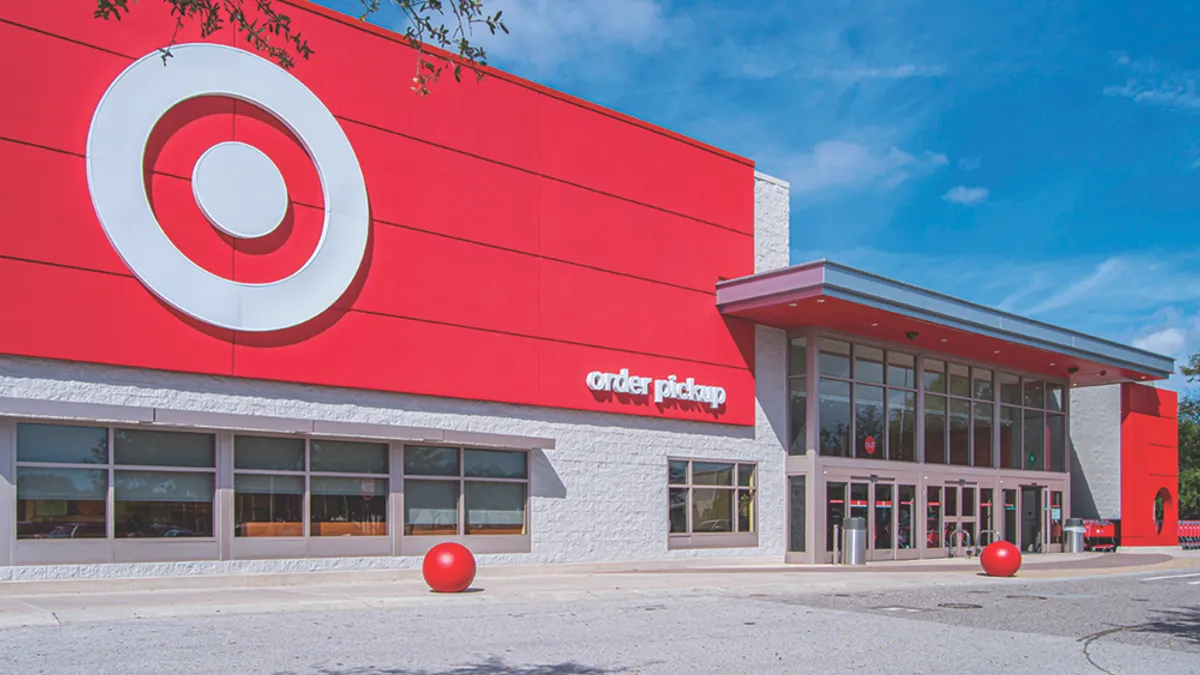Dive Brief:
- Target on April 7 plans to debut Target Circle 360, a paid membership program that builds on its Target Circle loyalty program, the company announced Tuesday. The new program will offer unlimited free same-day delivery for orders $35 and up, along with free two-day shipping, rivaling similar offerings from Walmart and Amazon.
- Target will offer three membership options – Target Circle, which will remain free; Target Circle Card (formerly Target RedCard) and Target Circle 360. As part of a launch promotion, the paid Target Circle 360 memberships will cost $49 for the first year for non-cardholders who sign up by May 18. After that, the annual cost for non-cardholders is $99. For Target Circle cardholders, the annual cost will be $49.
- At the same time, Target reported earnings, with Q4 revenue up 1.7% year over year to nearly $32 billion. Comparable sales fell 4.4% in the fourth quarter. For the year, revenue fell 1.6% to $107.4 billion from $109.1 billion a year earlier. Comps for the year fell 3.7%, while full-year operating income grew 48% to $5.7 billion from $3.8 billion a year earlier.
Dive Insight:
Target on Tuesday became the latest retailer to expand its loyalty program with a paid membership tier. The move gives the Minneapolis-based retailer a loyalty offering similar to Amazon Prime and Walmart+. At launch, Target’s program is comparable to Walmart+, which launched in 2020 at $98 annually, while Amazon Prime costs $139 annually after raising the price in 2022.
All are delivery-focused and Target’s offering comes as the retailer reported a nearly 14% rise in drive up, in-store pickup and its membership-based Shipt delivery service. The revamp and expansion of the Target Circle loyalty program with a membership-based tier is a compelling offer that’s likely to drive traffic, transactions and engagement, TD Cowen analysts led by Oliver Chen said in a Tuesday note.
First introduced in 2019, Target Circle has over 100 million members, the company said. The updated loyalty and membership experience is intended to enhance the personalization of the shopping experience, Cara Sylvester, Target’s chief guest experience officer, said in a statement.
The big-box retailer continues to look at enhancing the shopper experience overall. Target is known for inspiring and helping customers discover new products, which often results in people buying more than they intended, Christina Hennington, Target’s chief growth officer, said during the earnings call. “This is a key aspect of how we set ourselves apart from our competitors and something we’ll continue to build on regardless of where or how the shopping trip begins,” Hennington said.
Shopping is no longer a point-in-time transactional event, and consumers are constantly seeking inspiration from influencers and trendsetters, Hennington said. She added that Target sees an opportunity to accelerate this trend on its owned and external platforms like TikTok and Instagram.
CEO Brian Cornell said during the call one of the company’s long-term key strategies to expand its customer base is working to amplify Target’s appeal beyond its existing customer base. In addition to the new paid loyalty program, one way the company plans to do that is through continued investments in and growth of its store footprint.
Although retail is decades into the digital era, Cornell said two-thirds to three-quarters of all U.S. shopping is still done in store. Stores also drove over $30 billion in revenue growth and significant digital penetration growth for Target, which has invested in over 1,200 of its nearly 2,000 locations through remodels and partnerships.
“So if you think store shopping will wind down anytime in the next decade, we’ll politely disagree on that point once again,” Cornell said, who added that the company plans to open more than 300 new, mostly full-sized stores in the coming decade. Cornell also said additional supply chain facilities are in the pipeline.
The company issued a soft Q1 outlook, forecasting a same-store sales decline of 3% to 5%, while the retailer’s full-year guidance anticipates comps will range from flat to up 2%. Analysts with Jefferies said in a note that at the mid-point, Target’s Q1 and fiscal year guidance are near consensus estimates.
“Overall, we're encouraged by the sequential improvement in traffic comps, expansions to its membership program, and achievable guidance,” they said.
Correction: This story has been updated to reflect the annual membership price for customers.
















